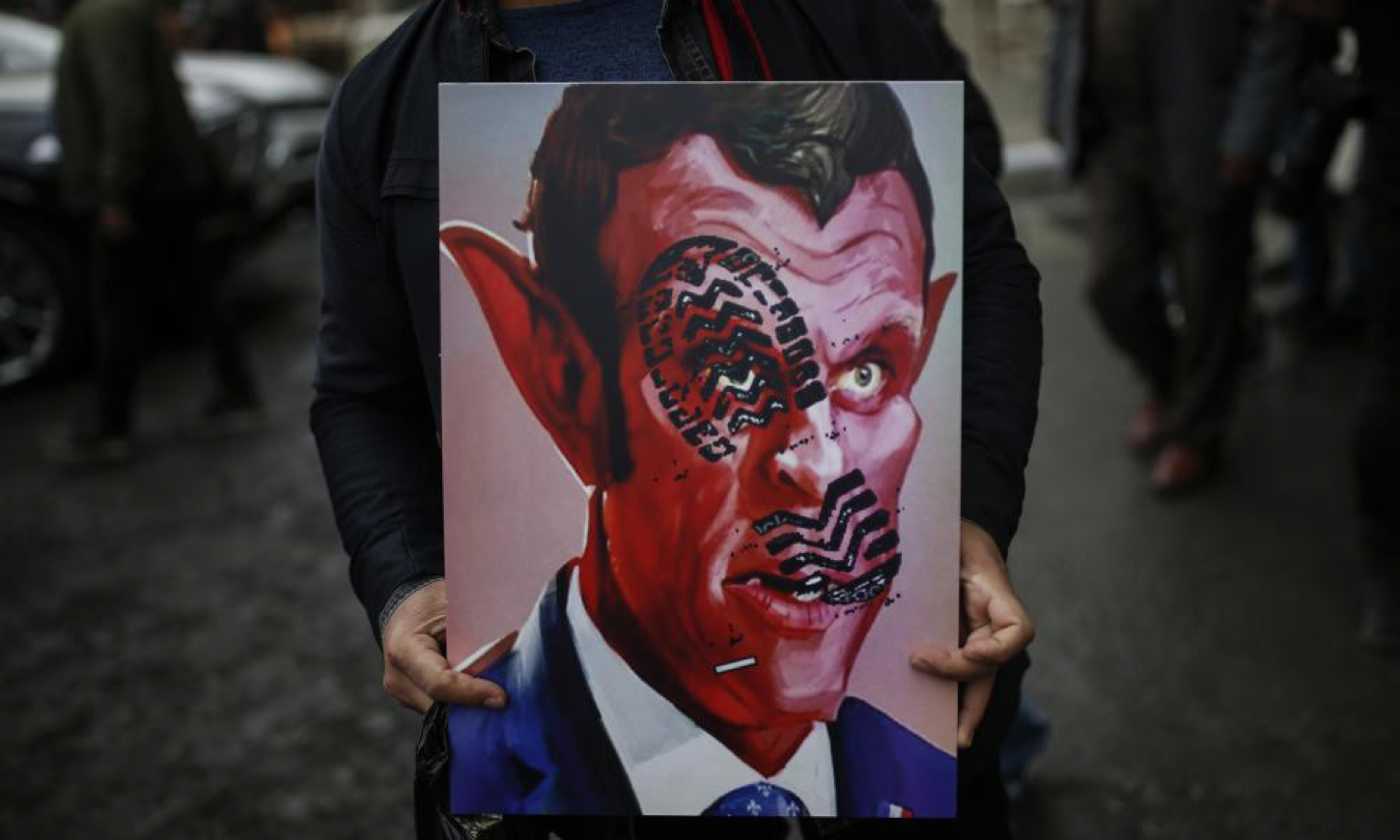Simon Tisdall
In his defence of freedom after the Charlie Hebdo attacks, the French president outraged both radical and moderate Muslims
Maybe he knew what he was doing. Maybe he didn’t. Either way, Emmanuel Macron set France and Europe on a new collision course with the Islamic world last month – all in the name of freedom. Last week’s spate of lethal terror attacks suggests the French president may have started something he cannot finish.
Macron’s impassioned speech on 2 October, vowing to fight “radical Islamism”, eradicate “separatism” and uphold secular values at all costs, foreshadowed this latest crisis. It was seen at the time as a mainly domestic political exercise, intended to spike the guns of France’s far right before his 2022 election campaign.
But Muslim leaders were enraged by Macron’s description of Islam as a faith “in crisis all over the world” that had, in effect, been hijacked by extremists. Then, two weeks later, after the murder of a Paris schoolteacher, Samuel Paty, by a foreign-born Islamist, an undaunted Macron doubled down. His defence of the notorious, recently republished Charlie Hebdo caricatures of the Prophet Muhammad, which Paty had shown to pupils, and a national crackdown on mosques, imams and Islamic groups added fuel to the fire. France itself was “under attack”, Macron dramatically declared, a phrase he repeated on Thursday.
Political and religious leaders from Bangladesh to Jordan and anti-French demonstrators publicly vented their fury, accusing him of doing “Satan’s work”. Much of what he said was misunderstood or purposefully distorted. Truth was a casualty, too.
Yet the fact remained: by loudly and uncompromisingly championing French values, Macron had managed simultaneously to outrage mainstream Muslim opinion and, apparently, to energise extremists.
The immediate, grim result, which fairly or unfairly will be laid at his door, was a string of attacks in Nice, Avignon and Saudi Arabia. France, struggling to contain a worsening Covid pandemic, is now on its highest terrorism alert, with schools and churches under armed guard.
Macron cannot be faulted for sticking up for the French post-Enlightenment ideal of an equal, integrated, secular and republican society. But he and other European leaders now face a possibly powerful Islamophobic, anti-Muslim backlash that could spawn yet more bloodshed.
This sudden explosion of violence and recrimination potentially affects everyone. All of Europe’s governments risk being drawn into a deepening polarisation, with evident implications for peace, security and social cohesion.
Like France’s National Rally (formerly the National Front), German, Italian and other far-right Islamophobic and anti-migrant populist parties whose public support has been falling of late must be licking their lips. Muslim leaders such as Pakistan’s Imran Khan have seized on the affair to deflect anger over their own failings.
Macron’s critics will say this is what comes of having an imperious president-in-a-hurry, pushing to seize the reins of European leadership. Macron wants to turn the EU into a more powerful, independent bloc that stands up for itself against the US, China – and Islam. But the price tag for his neo-Gaullist European vision keeps rising.
Europe’s most determined opponents have meanwhile spotted an opportunity. Chief among them is Recep Tayyip Erdoğan, Turkey’s president. He suggested Macron was mentally unbalanced. “Our history is one of a battle against tyranny and fanaticism,” Macron responded via Twitter. No prizes for which tyrant and fanatic he was talking about.
Erdoğan is a deeply unpleasant, authoritarian Islamic nationalist. But in one respect, he and Macron are alike. Erdoğan also casts himself as a pan-regional leader, as a tutor and defender of the Sunni Muslim world. This ambition was symbolised by his provocative re-designation of Istanbul’s former cathedral, Hagia Sophia, as a mosque.
Forget Trump v Biden – Erdoğan v Macron is the heavyweight bout of the year. The two have already gone several punishing rounds over disputed gas reserves in the eastern Mediterranean, Libya, Syria and Nagorno-Karabakh. At Macron’s urging, December’s EU summit will discuss sanctions on Turkey.
Yet two men’s clashing ideas and geopolitical rivalries do not explain the depth and breadth of Muslim-world fury. That stems from dismay felt by the overwhelmingly nonviolent Muslim majority about entrenched European Islamophobia, racial discrimination, cultural insensitivity, and heartless migrant policies.
Further afield, perceived French neocolonialism in the Sahel and apparent western indifference to the endless horrors in Syria, Yemen, Afghanistan, Myanmar and Xinjiang feed tensions. For many Muslims, the projection of the Prophet Muhammad caricatures on to the walls of several French cities after Paty’s death was intolerable. Yet so, too, was the attack on a Nice church. On both sides, lack of respect is a big part of the problem.
The destructive impact of Covid-19 has frayed tempers further, putting governments and citizens everywhere under pressure. Into this giant mantrap Macron has jumped feet-first, increasing, not reducing, misunderstanding at a time of extreme stress.
A Pew Research survey last year found that solid majorities of people in the UK, France, the Netherlands, Germany and Sweden hold positive opinions of Muslims in their country. In Italy and southern and eastern Europe, there is greater negativity. Although far-right populist parties continue to exploit fears about identity and immigration, especially among less-educated and older people, and although recorded incidents of Islamophobia are up, overall tensions have fallen compared with five years ago.
On the other hand, the French policy mandating assimilation into a prescriptively “lay” society – unlike British-style laissez-faire multiculturalism – appears too rigid. Macron should think again about how it is applied.
It’s plain the relationship between Muslims and non-Muslims in Europe remains fragile. The danger is obvious. Will the bitter furore over Macron’s justified but clumsy defence of French values, the perception Islam is under assault, and the ensuing terror, tip Europe into a new, confrontational downward spiral? Let’s hope not.




